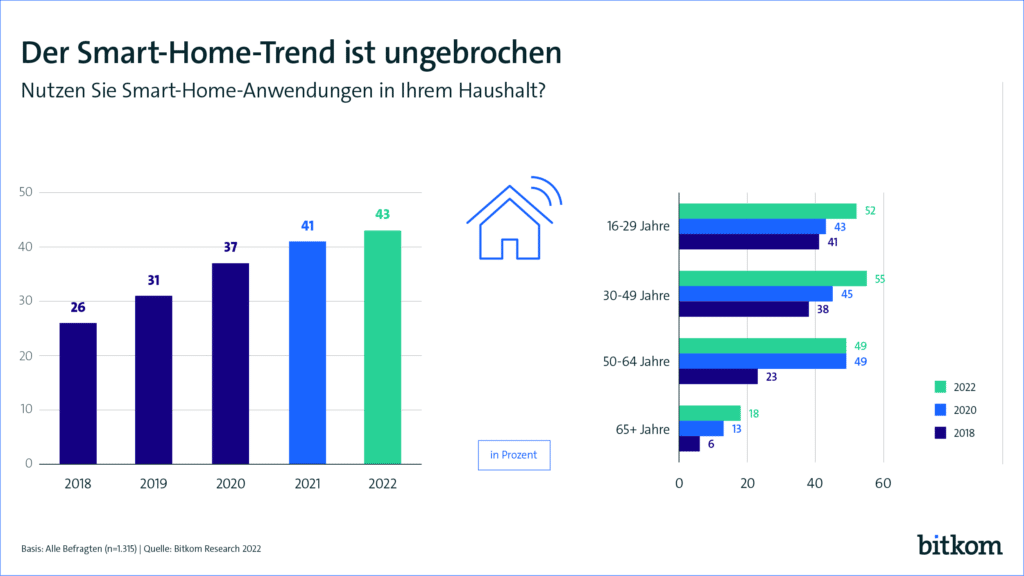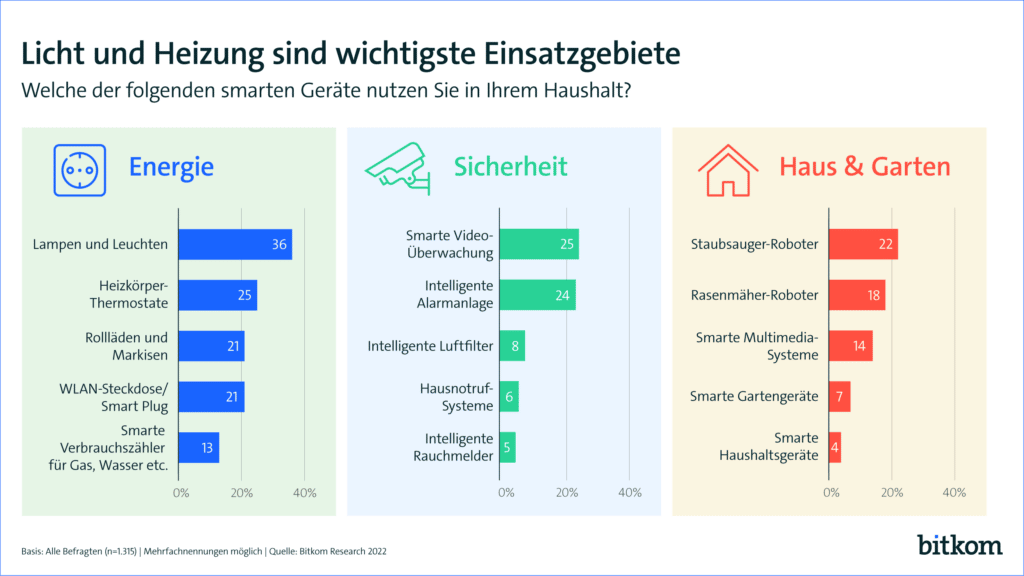Smart Home technology is the new trend to tackle the energy crisis. Energy prices are rising, autumn is approaching: almost all consumers are faced with the question of how to save heat and electricity. Smart home technologies play an important role in this context. Here are the results of a representative survey conducted by the digital association Bitkom among 1,315 people aged 16 and over in Germany.
Smart Home technology in German households
Over the past twelve months, the number of people who want to use smart applications to increase energy efficiency in their homes and reduce consumption has increased significantly: a quarter (25%) of Germans now use smart radiator thermostats. In 2021 it was only 17 percent and 15 percent in 2020. Smart thermostats regulate the temperature in the apartment depending on whether it is ventilated, whether there are people present and sometimes even taking into account the weather forecast: this means that the heating usually consumes significantly less energy than manual control.
One fifth (21%) use smart shutters or awnings, which turn off automatically when the sun is strong and thus provide cooling: in 2021 it was still 13%. One fifth (21%) also use smart sockets or WiFi to avoid stand-by by default (2021: 16%). 13 percent keep track of their consumption via smart meters (2021: 8 percent).
“Smart home technologies can make a very real contribution to using less energy for heating and electricity. They are much more than a technical gimmick. They increase energy efficiency, provide greater safety and ultimately increase the comfort and quality of life in your home. Smart heating and cooling technology isn’t just useful for homeowners. Smart thermostats can be installed in a few simple steps even in rental apartments and simply taken with you when you move. “
Achim Berg, president of Bitkom
Two-thirds use at least one smart home application
Overall, 43% of all German citizens use at least one smart home app in their own four walls. This is how the trend of recent years continues: in 2020 it was still 37 percent and in 2018 26 percent. The most used devices are smart lamps and lights, which more than a third (36%) are already using (2021: 29%). With them, the brightness or color of the light can be controlled not only via an app. Many models can be set to turn off automatically when a person leaves the room, helping to save energy.

Smart thermostats have a positive effect on at least half of them
Those who currently use smart thermostats often only installed them this year (22%) or last year (21%). 35% have been using them for two or four years and 17% for five years or more. The effect is measurable for many.
More than half (53%) report that their energy consumption has decreased since then: 22% significantly, 31% somehow. At 12 percent, power consumption remained the same in their own opinion. A third (33%) cannot yet make any statements about this because the devices have not been used for too long. However, 90% of users would recommend using a smart radiator thermostat to friends and family. 88 percent of all Germans are also calling for the potential of climate smart home applications to be made more known.
Smart home users are predominantly climate protectors
Those who use smart home technologies have an even clearer opinion when it comes to climate protection: three quarters (75%) believe that new buildings should not be built that do not have intelligent energy management. 89 percent are convinced: even with a small energy saving you can make a contribution against climate change.
“The use of smart technologies should already be considered when designing new houses and apartments. A reduction in VAT for particularly energy-saving technologies would also facilitate their uptake in private households and would be a sensible addition to other support measures that would directly ease the burden on consumers and support them in the run-up to autumn and winter. winter”.
Achim Berg, president of Bitkom
In this context, 9 out of 10 smart home application users (90%) would like a clear label on their devices to indicate whether they contribute to climate protection.
Smart security
Another important area in the smart home market is security. For example, a quarter of Germans (25%) use smart video surveillance to protect themselves or their home from thieves (2021: 23%). 24% use an intelligent alarm system (2021: 21%).
Smart home emergency call systems (6%) and smart smoke detectors, which only one in twenty people have used so far (5%), are significantly less common. For most smart home users, making their home or apartment safer is critical to using appropriate technologies (74%). More comfort and quality of life (74%) and energy savings (72%) are almost equally important.
“Seniors in particular should address the issue of the Smart Home or seek appropriate advice. For example, sensors can detect when a person has fallen and automatically call for help. Smart home technologies help people live independently in their own four walls for longer. “
Achim Berg, president of Bitkom
The 65+ generation is still relatively small among smart home technology users. Only 18% of over 65s use such devices. However, this value has tripled since 2018, when it was only 6%.
Robot vacuum cleaners in almost one in four households
Among smart home helpers, the robot vacuum cleaner tops the rankings: 22 percent already let it go around the house – there has also been a significant increase here (2021: 13 percent). In the gardens of 18% of Germans, robotic lawnmowers mow the lawn and 14% have installed intelligent multimedia systems for entertainment. Only 4% of Germans own other smart appliances such as washing machines, dishwashers or smart refrigerators.
Which rooms are networked?
Through the various technologies: In which rooms of the house or apartment are the networked devices installed? Most users of smart home technologies use them in the living room (79%), almost as many in the dining room (78%) or in the kitchen (74%) and a little less in the bedroom (69%) .
Smart home technologies are also found in the bathroom (57%), in the study (49%) or in the hallway (38%). In the garden (51%) and in the garage (35%), smart devices and applications are also used relatively frequently and for a quarter of smart home users also in the children’s room (24%).


Control your smart home with your smartphone
The smartphone plays an important role in control: 85% control their smart home apps and devices via the smartphone app. 55 percent issue voice commands, whereby this is usually done via a stationary voice assistant or a mobile voice assistant, even via smartphone. 20 percent control smart home devices via remote control.
“The smart home has become the leading application for voice control of devices.”
Achim Berg, president of Bitkom
Security concerns often keep smart homes away
Those who don’t have smart devices in their home are often put off by security concerns. Almost half of non-users (47%) fear hacker attacks. 37% fear their personal data will be misused and 29% are concerned about their privacy. For many, the devices are either too expensive (29%) or find the operation too complicated (29%).
“The issue of IT and data security plays an important role for many smart home users. The important thing is not to go to the bottom of the garbage, but to look for products certified according to international standards and reliable and reliable manufacturers. And: protect your WLAN, update your devices regularly. ”
Achim Berg, president of Bitkom
In this context, the BSI cybersecurity label can provide good guidance. 88% of smart home users would like a clear indication of the safety of a smart home product.
Failures occur, but rarely
Despite these concerns, no one has yet observed hacker attacks on one of their smart home devices. For those who rarely (22%), occasionally (15%) or regularly (4%) have problems with applications, this is usually due to an interruption in the Internet connection (83%). One fifth had problems with the associated app (21%) or another device malfunction (20%). Own operational errors have already led to 8% failures. Just over half of all users (55%) have never had an application error.
The smart home of the future: more safety and autonomy
The smart home technology market is developing rapidly. Germans are very open to future scenarios for smart devices. 76 percent can imagine using a robot vacuum that recognizes when it’s time for the next cleaning and starts automatically. 54 percent like the idea of an oven that learns how crunchy residents like their roast and cooks it to perfection on its own. Half of Germans (50%) could imagine a refrigerator that plans meals according to the owner’s preferences and orders the appropriate groceries.
Great potential in the area of security
In the area of security in particular, smart home technologies can develop even more potential in the future: 80 percent can imagine living in a home that recognizes when water damage is imminent and automatically closes the door. water. Or that it recognizes elementary damage, for example from hail or lightning, and automatically informs residents, for example via an app (72%). 62% would use a home that recognizes a resident’s fainting or unconsciousness and automatically asks for help.
“Smart home applications will be found in more and more households in the coming years. Not only do they make life easier and provide greater safety, they can also significantly reduce energy consumption. Much of the final energy consumption is currently used for warm apartments and hot water. Smart tools relieve pressure on the long-term portfolio, accelerate the energy transition with greater energy efficiency and at the same time reduce dependence on Russian gas and oil. “
Achim Berg, president of Bitkom
Those: In battle
Don’t miss the latest Mimikama fact check! The Meow-Ring – The cat that crawls off the TV
–
A notification: This content reflects the current state of affairs at the time of publication
was. Playback of single images, screenshots, embeds or video sequences is used
discussion of the issue with the topic.


